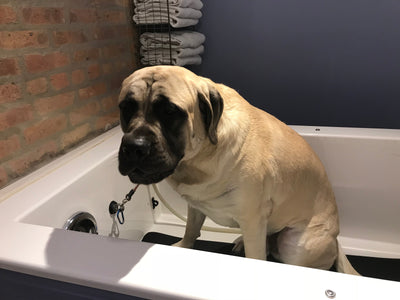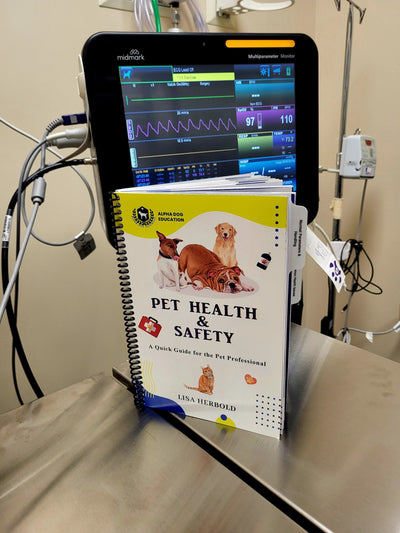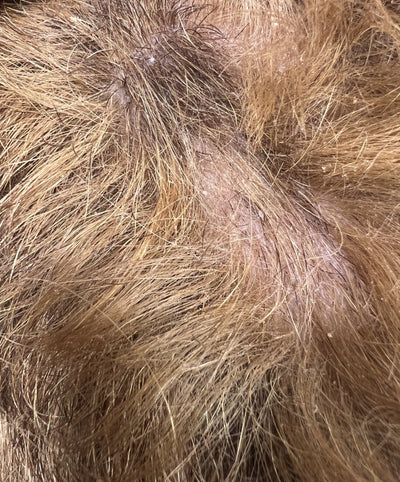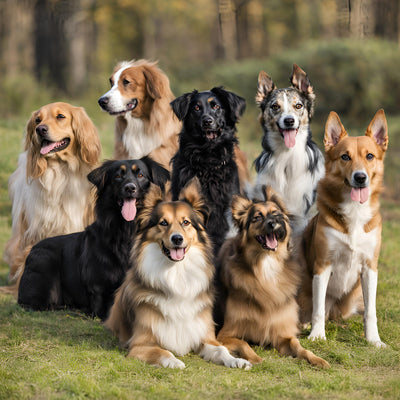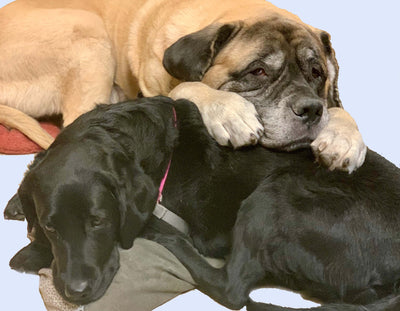Professional Pet Grooming is an artisan trade skill that takes more than just hands-on skills. Many non-professionals don’t realize it’s not “just a haircut”. If you want to use a human analogy, think of it as an entire salon day including Manicure, pedicure, a hair style (that covers the whole body not just the head) and more. Professionals learn everything from specialized animal handling skills, skin, and coat types to creating various styles. A “bath and a blow dry” is just the beginning.
The professional animal grooming industry in the United States is expansive and includes almost every domesticated animal and a few exotics. Currently, most professional animal groomers, including Farriers and Horse groomers, are not required to be state or federally licensed. The various branches of animal grooming do have national trade certification programs available and a similar educational pathway that professional pet groomers for dogs and cats follow.
There are a few recognized formal pathways and combinations to achieve a professional level of education for Professional Pet Groomers:
- Licensed Government Programs: Earning a Diploma and/or Certificate from a licensed state/federal trade school
- Accredited Salon Apprenticeship Programs: Earn a Professional Certification through a school with a Certified Master Groomer and/or within a Certified Master Grooming Salon.
- Private Mentorship Programs: Work as an Apprentice and earn a Professional Certification through one of main trade association’s industry certification programs.
- Private Corporate Programs: Sign an employee contract with a large corporation offering Pet Grooming training.
Licensed State Trade/Vocational Schools
State Trade Schools are state licensed and many are nationally accredited. Each state has an extensive license application and licensing process that the school must adhere to regarding curriculum, operations, and facility management. States want to be assured that the curriculum developed allows students to thoroughly understand and execute the trade they will learn.
In Illinois, for example, trade schools must provide career-focused vocational programs that utilize classroom lessons with hands-on experience through a practicum (a grooming shop setting). Students are allowed to work with a limited number of animals per day to prevent injury and maintain a learning environment.
Government diplomas set an accreditation standard for education to ensure that the student has been taught best practices for that profession. The end goal is to formally recognize programs that have awarded students for a specific level of educational achievement within standardized and replicable training results.
Most importantly, students who attend a state certified trade school can receive funding through grants, scholarships, and other types of financial aid. Most of these schools include additional industry focused certification requirements included in the program such as a CPR certification which needs to be re-tested every 2 years. Accreditation is key for two reasons 1) government scholarship, grant, and financial aid options 2) consistency in higher level of education and skill building.
Some states also require federal accreditation which is a separate application and implementation process. Once federally licensed, the school then can get federally accredited after having at least one graduation class and being open and operating for at least two years. An independent accreditor evaluates the state licensed school on the following:
- financial stability
- state licensing credentials
- related purpose, programs, policies, and procedures
- hands-on program components
- curriculum focuses on consistent, replicable training result
The Accrediting Commission of Career Schools and Colleges has the largest database for licensed and accredited trade schools throughout the nation. State licensing offers students financial state resource opportunities while nationally accredited school allows students to tap into federal financial resources. Having both state and national accreditation gives students access to a wide range of financial resources. To find out if the school you are looking into is accredited, search the ACCSC directory.
Accredited Salon Programs
Private Trade Schools are available but do not necessarily follow the state licensing criteria and are not necessarily eligible for government scholarships. Private schools with financial aid must have been accepted by the federal government for Title IV Financial Assistance. The “ Title IV eligibility and participation requirements for institutions establish a framework of federal oversight for a significant portion of the postsecondary schools”. To be allowed Title IV eligibility and participation, the school must show “institution eligibility, administrative capability, and financial responsibility”.
These schools are usually developed and managed by professionals that are nationally certified (or in some cases the facility has a “salon certification) through one of the major three professional trade associations which adhere to specific standard practices which are utilized for all training. These three well-known nationally recognized certification entities are:
- International Society of Canine Cosmetologists (ISCC)
- National Dog Grooming Association of America (NDGAA)
- International Professional Groomers, Inc. (IPGICMG)
Many of these schools include additional certification requirements such as a CPR certification which needs to be re-tested every 2 years.
Mentorship/Apprenticeship
Mentorships or apprenticeships take all forms. It usually involves starting at the beginning of the grooming process and working one’s way up to higher skill levels. Each grooming shop or mentor has their own methodology and approach. Many are created by Master Certified Groomers who have obtained their Master Level with ISCC, NDGAA, or IPGICMG and sometimes the Salon has also gone through the same trade association certification process.
However, the methods to achieve professional pet training will vary based on the Mentor’s educational and professional background. Note, some Professional or Corporate Trade Schools fall under this category due to the program’s consistency and results.
Private Corporate Programs
Business trade schools are developed by business entities such as PetSmart and Petco. Some of these programs require employee contracts and vary in length and skill training. These private businesses may offer a private personnel certification process.
Deciding the Best Path
New procedures for grooming and animal handling are developed constantly based on updated scientific research, new technologies and innovative methodologies. The professional pet grooming industry continually strives to improve the safety and well-being of groomers and animals while elevating core skills.
The goal of every student and early professional should be to complete, at a minimum, the following to cover the necessary optimal qualifications to be a Professional Pet Groomer:
Trade School Certificate/Diploma, Private Trade School Certification and/or Mentorship/Apprenticeship
- AKC Salon Safe Certification
- CPR Certification (usually included within a Trade School Curriculum)
- Professional Grooming Credential (PGC)
Beyond the Basics
Whether you decide to do a school setting for a Trade Diploma, Certification, or Apprenticeship with the goal to become a Professional Pet Groomer, it is important to understand that this industry is very fluid. Continuing education is highly recommended and encouraged, especially by state and national trade associations.
There is a distinct difference between certifications and certificates. Understanding these differences is important when considering formal education and continuing educational goals and objectives for enhancing professional skills. The difference between certifications and certificates has been standardized by the NCCA Accreditation and Institute of Credentialing Excellence third party credentialling organizations as follows:
Professional or Personnel Certification Program are programs that focus on learning and demonstrating a mastery of a learned topic(s).
These are more broad-based programs that validate and confirm participant’s knowledge, skills, or competencies within a field.
- Require formal educational or professional experience.
- Requires on-going review
- Assess skills, knowledge, and competencies for a specific job function.
Assessment Based Certificates are programs that focus on learning and demonstrating a mastery of a learned assignment.
- These are very focused programs building knowledge, skills or competencies for a specific task or skill
- No previous experience is required for eligibility
- On-going professional review is not required
- Provides instruction and/or training then assesses mastery
Becoming a National Certified Master Groomer is one of the highest achievements a professional pet groomer can achieve. The three well-known trade association certification organizations require rigorous written and visual presentation testing that goes beyond the entry level basics.
- International Society of Canine Cosmetologists (ISCC)
- National Dog Grooming Association of America (NDGAA) now AKC
- International Professional Groomers, Inc. (IPGICMG)
Many groomers strive to become a National Certified Master Groomer to allow for more opportunities in the field including teaching and competition.
There are many more specialized certifications that exist and are developed through continuing educational companies. One of the largest continuing education providers is Barkleigh Productions, trade show conventions that provide a variety of continuing education through various sources.
The Professional Pet Grooming industry now, more then ever, has many jobs available. Many have retired and the influx of dog and cat ownership has greatly increased. It can be a rich and rewarding career.
References:
Choosing a Vocational School or Certificate Program | Consumer .. https://consumer.ftc.gov/articles/choosing-vocational-school-or-certificate-program. Accessed 18 Mar. 2023.
NCCA. https://www.credentialingexcellence.org/Accreditation/Earn-Accreditation/NCCA. Accessed 18 Mar. 2023.
Certificate Vs. Certification. https://www.credentialingexcellence.org/Accreditation/New-to-Accreditation/Certificate-vs-Certification. Accessed 18 Mar. 2023.
Certifications — NDGAA. https://nationaldoggroomers.com/certifications. Accessed 18 Mar. 2023.
International Professional Groomers, Inc. https://ipgicmg.com/. Accessed 18 Mar. 2023.
ISCC Certified Professional Pet Groomer (ICPG). https://www.iscceducation.com/professional-groomer.html. Accessed 18 Mar. 2023.
PGC - Professional Grooming Credential - World Pet Association. https://www.worldpetassociation.org/grooming-credentialing-program/. Accessed 18 Mar. 2023.
AKC Canine College – American Kennel Club. https://www.akc.org/public-education/resources-for-clubs/akc-canine-college/. Accessed 8 Oct. 2023


